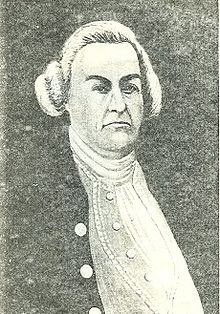Timothy Ruggles
| Timothy Dwight Ruggles | |
|---|---|
 |
|
| Speaker of the Massachusetts House of Representatives | |
|
In office 1762–1764 |
|
| Preceded by | James Otis, Sr. |
| Succeeded by | Samuel White |
| Member of the Massachusetts House of Representatives for Hardwick |
|
|
In office 1754, 1757, 1761 – 1755, 1759, 1770 |
|
| Chief Justice of the Court of Common Pleas of the Province of Massachusetts Bay |
|
|
In office January 21, 1762 – 1774 |
|
| Judge of the Court of Common Pleas of the Province of Massachusetts Bay |
|
|
In office April 19, 1757 – 1774 |
|
| Personal details | |
| Born | October 20, 1711 Rochester, Massachusetts |
| Died | August 4, 1795 |
| Resting place | Wilmot, Nova Scotia |
| Spouse(s) | Bathsheba Newcomb née Bourne |
| Children | Martha Ruggles (b. August 10, 1736), Timthy Ruggles (b. January 7, 1738-39), Bathsheba Ruggles, John Ruggles, Timothy Ruggles, Richard Ruggles. |
| Residence | Wilmot, Nova Scotia |
| Alma mater | Harvard |
| Occupation | Lawyer |
| Military service | |
| Allegiance | Province of Massachusetts Bay |
| Service/branch | Massachusetts militia |
Timothy Dwight Ruggles (October 20, 1711 – August 4, 1795) was an American military leader, jurist and politician. He was a delegate to the Stamp Act Congress of 1765.
Ruggles was born on October 20, 1711 to Rev. Timothy Ruggles. He was grandson of Capt. Samuel Ruggles of Roxbury and Martha Woodbridge, who was a granddaughter of Governor Thomas Dudley.
He graduated from Harvard in 1732; studied law, and established himself in practice in Rochester. In 1735 he married Mrs. Bathsheba Newcomb, widow of William Newcomb and the daughter of the Hon. Melatiah Bourne of Sandwich, Massachusetts. He was a military officer during the French and Indian War.
After serving as Speaker of the Massachusetts House of Representatives in 1763, he was selected as a delegate to the first colonial (or Stamp Act) congress of 1765 meeting in New York on October 7, Ruggles was elected its president. After he refused to sanction the addresses sent by that body to Great Britain he was publicly censured by the General Court of Massachusetts.
He became one of the leading Tories of New England. He commanded the Loyal American Association and was a Mandamus Councillor appointed by General Gage in Boston. The Loyal American Association vowed to: - Not submit to rebellious assembly. - Enforce obedience to the King. - Defend each other if imperiled by unlawful assembly. - Repel force with force. - Use retaliation if any member or their property were injured.
In 1775, he became a Loyalist and left Boston for Nova Scotia with the British troops and accompanied Lord Howe to Staten Island. His estates were confiscated and he was named in the Massachusetts Banishment Act. In 1779 he received a grant of 10,000 acres (40 km²) of land in Wilmot, Nova Scotia, where he settled.
...
Wikipedia
